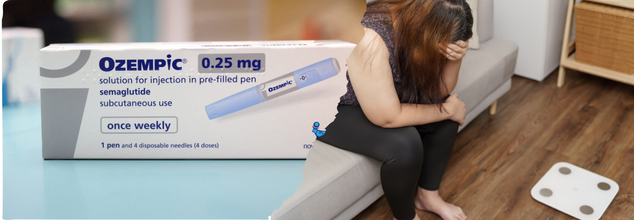- Health Conditions A-Z
- Health & Wellness
- Nutrition
- Fitness
- Health News
- Ayurveda
- Videos
- Medicine A-Z
- Parenting
- Web Stories
BMI Calculators Cannot Predict Your Risk Of Death - Which Metric Can We Use?

(Credit-Canva)
Health is not linear for everyone. Many people have skewed perception about health; they think a person who is thin is naturally healthy, while a person who is overweight is inherently unhealthy.
A recent study published in the Annals of Family Medicine suggests that BMI, a measure of body fat based on height and weight, is a poor predictor of a person's risk of death. Instead, the study highlights body fat percentage (BF%) as a more effective and easily assessed measurement during routine checkups.
Shortcomings of BMI
Doctors have traditionally used BMI to check a person's fat, bone, and muscle health, especially since body composition is linked to a higher risk of conditions like type 2 diabetes and heart disease. BMI is calculated by dividing a person's weight by their height squared.
While a higher BMI can sometimes suggest a greater chance of developing certain health problems, there's growing evidence that it's an imperfect measure. It doesn't consider important factors like a person's age, biological sex, or how their fat and muscle are distributed.
For example, top athletes often have a lot of muscle, which can give them a high BMI. Even though these athletes are very healthy, focusing only on their BMI might incorrectly label them as having obesity.
On the other hand, some people with a "normal" BMI might still be at a higher risk for conditions like diabetes, high blood pressure, and fatty liver disease. These individuals are sometimes referred to as having "normal weight obesity" or, in simpler terms, being "skinny fat."
Why Body Fat Percentage Might Be Superior
With the limitations of BMI in mind, researchers looked into how strongly BMI is connected to the risk of death. They also wanted to see if body fat percentage, which they described as "an easy, reliable, and inexpensive measure," could do a better job of predicting this risk.
The research team analyzed health information from thousands of adults. This data included height, weight, waist size, and body fat percentage. They calculated BMI for these individuals and then tracked who passed away over many years. After considering various factors, the scientists made some key discoveries:
There was no significant link between having a BMI categorized as obese (meaning a BMI of 25 or higher) and a greater risk of dying from any cause when compared to those with a "healthy" BMI.
Body fat percentage, however, provided clear insights into mortality risk. Individuals with a high body fat percentage (27% or more for men and 44% or more for women) were significantly more likely to die from any cause.
Waist size was less accurate than body fat percentage but still showed some connection to a higher risk of death.
The Future of Health Assessments
The study suggests that directly measuring body fat percentage, which is relatively inexpensive and easy to do in a doctor's office, is better at predicting future mortality risk than using BMI.
This doesn't mean doctors should stop using BMI entirely. It can still be a simple starting point to help determine if a patient needs to lose weight or gain muscle to prevent chronic diseases. But it should be seen as just that—"an easy first step."
Ideally, other measurements should also be taken. The more information doctors have—including BMI, waist size, body fat, blood pressure, and cholesterol—the more complete a picture they'll have of a patient's health. Modern devices can measure body fat percentage quickly, often in under a minute. It's hoped that more doctors will start using body fat percentage measurements, as a direct measure of body fat can be a valuable tool for preventing disease.
Loneliness Of Widowed Adults Could Be A Permanent Mental Scar - Even Adult Children Cannot Help

(Credit-Canva)
Losing a spouse is one of the most difficult things that a person can go through. It is a thing that many people go through as they age. Many people who lose their partners often find comfort in their close ones, their children as well as their friends. However, can the void left by a deceased spouse be healed by your loved ones?
A new study suggests that adult children likely won't fill the emotional void left when a parent loses their spouse. While becoming a widow or widower might make the bond with their children stronger, this deeper connection doesn't seem to make up for the loneliness of losing a life partner. These surprising findings were published on July 14 in Aging & Mental Health.
Going Against Common Ideas About Loneliness and Loss
This study's findings actually challenge a common belief. Many people think that widowed individuals who have children feel less lonely compared to those who don't. However, this research tells a different story.
The loss of a spouse causes loneliness that sticks around for a long time. Interestingly, it also makes the family ties between parents and their children stronger, especially for mothers, who often take the lead in keeping families connected. But even with these stronger family bonds, the study found that the increase in loneliness – both social (feeling disconnected from others) and emotional (missing a deep, personal connection) – doesn't go away.
How the Research Was Carried Out
The study involved talking to over 5,600 married people who had grown-up children. These individuals were part of a larger study about aging in Germany. Among them, nearly 500 had experienced the death of their spouse.
Losing a spouse is known to be one of life's most difficult and stressful events. It can lead to various health problems, including heart issues, and mental health challenges like depression or chronic loneliness.
Participants in the study answered a series of questions. These questions were designed to understand their emotional and mental well-being, as well as how connected they felt to their adult children.
Long-Lasting Impact of Loneliness
The results clearly showed that loneliness significantly increases after a spouse passes away and stays at a high level for a long time. This was true even when adult children kept in regular touch with their widowed parent.
The most difficult period for loneliness seemed to be the first three years after the loss. However, the study found that loneliness continued to be a factor for as long as seven years after their spouse's death.
These findings were quite surprising to the researchers because previous studies had shown that older parents' happiness and well-being are greatly influenced by how good their relationships with their adult children are. It appears that the sadness and impact of losing a spouse are so profound that even strong emotional and social support from one's children can't fully lessen it.
More Research Needed
It's important to note that this study didn't look at how relationships with other people might affect a person's loneliness. This includes close friends or even just people they know casually.
The researchers pointed out that interactions with people who aren't family members might have a bigger impact on feelings of social loneliness than interactions with one's own children.
Warning Letter Sent To Companies Selling Illegal Opioid Compound

Credits: Canva
In a significant move to safeguard public health, the U.S. Food and Drug Administration (FDA) has issued warning letters to seven companies accused of illegally marketing products containing a powerful compound found in kratom, known as 7-hydroxymitragynine (7-OH). These companies have been selling concentrated versions of the substance in forms like tablets, gummies, drink mixes, and energy shots—many of which are available online and in everyday retail outlets such as smoke shops, gas stations, and convenience stores.
What Is 7-OH and Why Is It a Concern?
7-hydroxymitragynine is a chemical compound that naturally occurs in very small quantities in the kratom plant. However, in these commercial products, it is either added in high concentrations or manipulated to raise the levels well beyond natural amounts. The problem? 7-OH is not approved by the FDA for use in any dietary supplement, conventional food, or pharmaceutical drug.
According to the agency, not only does this make these products illegal, but it also raises serious health and safety concerns. The FDA emphasized that the compound has not been proven safe or effective for treating any health condition and warned that consumers using these products are putting themselves at risk.
Illegal and Unsubstantiated Claims
The companies receiving the warning letters were accused of marketing their 7-OH products with unproven claims about treating pain, anxiety, and other medical conditions. Some of these products are being sold as dietary supplements or even regular food items, despite not meeting the legal or scientific safety standards required for such classifications.
The FDA’s main concern lies in how these products are being presented to the public—as safe, natural remedies—when in fact they may be both unsafe and illegal. “People using these products are exposing themselves to substances that have not been proven safe or effective for any use,” the FDA warned in a statement.
The Companies Named
The seven companies that have been sent official warning letters include:
- Shaman Botanicals LLC
- My Smoke Wholesale
- Relax Relief Rejuvenate Trading LLC (also known as RRR Trading or EDP Kratom)
- Thang Botanicals Inc. (doing business as 7ΩHMZ, 7-OHMZ, or 7OHMZ)
- Royal Diamond Imports Inc. (operating Roxytabs.com)
- Hydroxie LLC
- 7Tabz Retail LLC
All seven companies have been given 15 business days to respond to the FDA’s concerns. They are required to outline what actions they will take to correct the violations. Failure to respond or take corrective measures could lead to further enforcement actions, including product seizures or legal injunctions.
FDA Urges Caution
This latest crackdown reflects the FDA’s ongoing concerns around kratom and its derivatives, particularly products containing high concentrations of 7-OH. Consumers are urged to avoid such products and consult healthcare professionals before using any substance marketed as a pain or anxiety remedy.
The agency continues to monitor the market and has signaled it will take further steps if necessary to protect the public from unsafe, misbranded, or illegally marketed products.
Ozempic, Wegovy Aren't Magic, These 5 Body Traits Predict If You’ll Actually Lose Weight

Credits: Canva/Reuters
For anyone who's been following the meteoric rise of weight-loss injections like Ozempic and Wegovy, one thing is certain: these medications are effective but not for everyone. Now, a new, in-depth study might know why.
Appearing in the journal Diabetes, Obesity and Metabolism, this new research has identified key determinants of who is most likely to thrive on GLP-1 receptor agonists (GLP-1RAs), a drug class that includes semaglutide (Ozempic/Wegovy). Ranging from use duration to body composition, and from metabolic rate to diabetic status, the results yield a finer set of directions for individualized obesity treatment—and may potentially minimize the guesswork that too often vexes patients and clinicians alike.
GLP-1RAs are drugs initially made to treat type 2 diabetes but have produced miraculous outcomes for the treatment of obesity. They function by duplicating a hormone that occurs naturally in the body, which suppresses hunger and controls the blood sugar levels. Semaglutide, the drug behind Ozempic and Wegovy, has assisted individuals in losing an average of 15–21% of their body weight when combined with diet and lifestyle modifications.
Even with all the news-grabbing changes and social media hype, results are all over the place. Some patients lose weight rapidly, others plateau, and some develop side effects such as nausea that cause them to quit cold turkey. The new research, performed at Peking University People's Hospital, sheds some light on why.
Scientists monitored 679 overweight or obese patients who initiated GLP-1RA treatment between November 2022 and October 2024 at an obesity clinic in Beijing. For 12 months, they monitored a range of physical and metabolic factors to determine what characteristics were associated with improved outcomes.
Patients taking GLP-1RAs for extended periods, particularly semaglutide, had higher odds of significant weight loss. But more than how long the patient was on the drug, study authors determined that individual traits mattered substantially in effectiveness.
In particular, individuals who did not have diabetes, had a higher percentage of body fat, larger amounts of skeletal muscle, and a higher rate of basal metabolism were found to be more likely to succeed. Also, higher serum creatinine levels (a marker for muscle mass and kidney function) were associated with improved success.
Role of Muscle Mass and Metabolism
GLP-1s are effective devices, but they need to be combined with muscle-sparing measures. Most patients inadvertently lose lean muscle mass, which can lower metabolism and undermine long-term weight control.
That is, the scale may fall, but what you lose is important. Retaining muscle mass is essential to long-term health and success. Because of this, experts suggest a two-prong approach: savvy, high-protein eating and regular strength training to help maintain lean tissue throughout treatment.
5 Body Traits That Predict If You'll Actually Lose Weight on GLP-1 Drugs
New research is showing that not everyone responds the same way to GLP-1 receptor agonists—and your body’s makeup may be the key to understanding why. Here are five physical traits that strongly predict whether you’ll shed pounds successfully while on these weight-loss medications:
1. Higher Body Fat Percentage
Individuals with excess body fat at the beginning of treatment respond to GLP-1 drugs more favorably. Why? They attack hunger and fat storage, so people with more to lose are more likely to see faster and more dramatic results.
2. Increased Skeletal Muscle Mass
Muscle is not only for power—it burns calories even at rest. Individuals with greater skeletal muscle mass (particularly in the arms, legs, and abdomen) tend to have a quicker metabolism, which can strengthen the actions of weight-loss drugs.
3. Increased Basal Metabolic Rate (BMR)
A greater BMR indicates that your body expends more energy on a daily basis. Individuals with naturally quicker metabolisms are more apt to experience efficient and long-lasting weight loss when taking GLP-1RAs such as semaglutide.
4. Greater Serum Creatinine Levels
This marker is most commonly associated with muscle mass and kidney function. Individuals with slightly elevated (but normal) levels of creatinine—usually an indicator of greater lean body mass—tended to respond more favorably to these drugs.
5. No Diagnosis of Diabetes
Against expectation, individuals with no diabetes experienced more success than those with diabetes. This could be explained by improved insulin sensitivity, reduced metabolic resistance, or fewer pre-existing complications that would interfere with weight reduction.
How Your Diabetes Status Is Important?
The research demonstrated that those without diabetes had considerably higher chances of being successful with weight loss compared to those with prediabetes or diabetes. This could be because of deep-rooted metabolic distinctions or that GLP-1RAs react differently in states of insulin resistance.
Lead researcher Dr. Linong Ji described, "This study highlights the value of metabolic state-matched strategies. Individuals with diabetes can benefit from a different or more combined regimen."
Consistency is key, patients who remained on the drug for a longer period were more likely to lose weight. Those who dropped out early because of side effects, lack of response, or lifestyle interference were far less successful.
This accords with demands from doctors for improved support for adherence. Greater follow-up frequencies, tailored coaching, and symptom control can avert early dropouts.
"Adherence to medication is neglected but equally important as the medicine itself," the authors stated. "Physicians must assist patients in staying on track, especially for the first months or so."
Side Effects of GLP-1 Drugs
Side effects, particularly gastrointestinal such as nausea, constipation, or vomiting, are still the number one reasons individuals drop out of GLP-1RAs. That's where tailoring treatment comes into play even more so.
Take, for instance, individuals who have less skeletal muscle mass. These individuals are likely to be more susceptible to fatigue and muscle wasting, enhancing dropout risk. Tweaking dose schedules, incorporating physical therapy, or emphasizing diet quality can all help mitigate these problems.
The global rise of drugs like Wegovy isn’t just hype. These medications are proving to be some of the most effective tools we’ve ever had in the fight against obesity, a condition affecting over 650 million people worldwide but what this new study makes clear is that weight loss is not one-size-fits-all, even with powerful drugs. Body composition, muscle mass, metabolic health, and individual biology all play a role.
For doctors, that equates to taking a precision medicine approach—tailoring treatments based on an individual's profile, instead of simply dosing all patients the same.
And for patients? It's a reminder that medications such as Ozempic and Wegovy can be remarkably powerful but only as part of an integrated, personalized plan that values the complexity of your body.
GLP-1 medications are revolutionizing weight control, but as this study reveals, success is not arbitrary success is individual. Understanding what influences results can enable more individuals to achieve potential through progress.
© 2024 Bennett, Coleman & Company Limited

